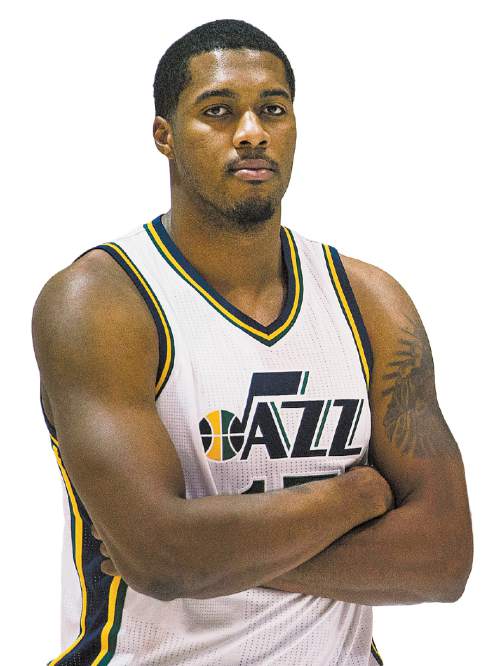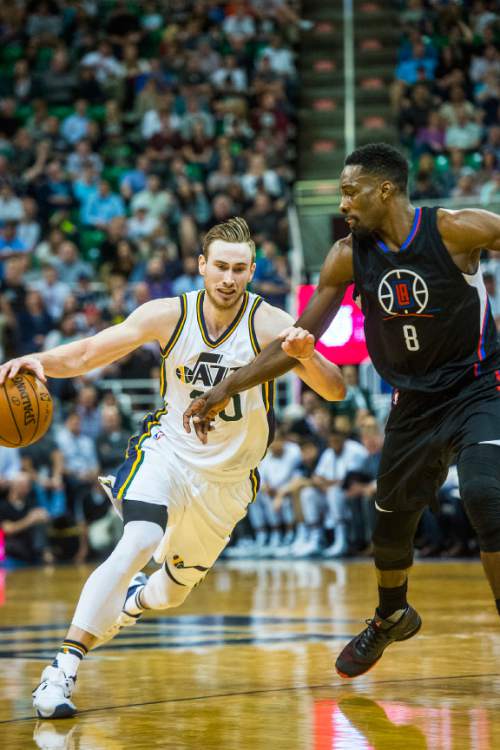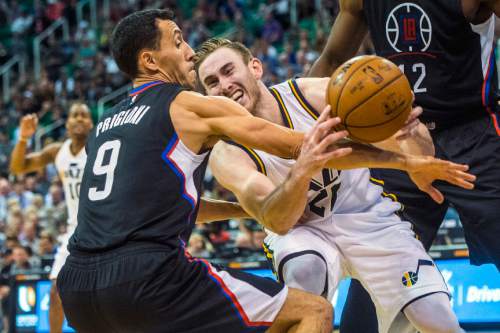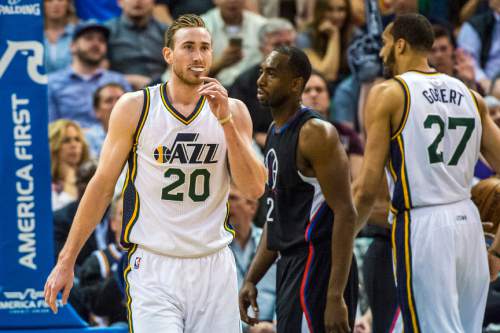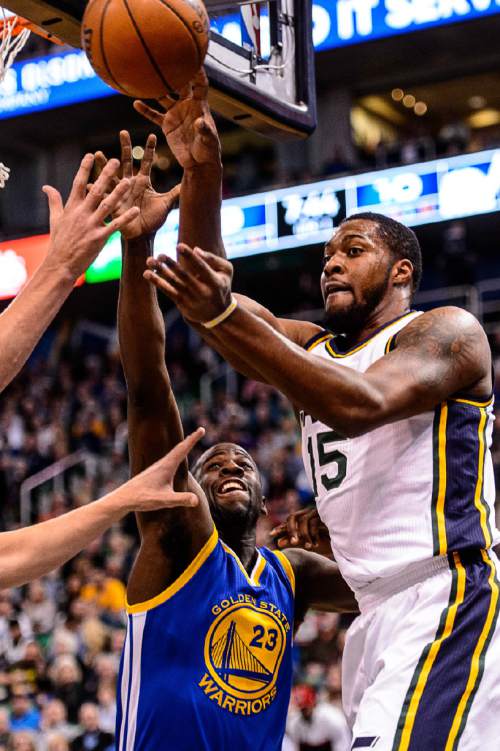This is an archived article that was published on sltrib.com in 2016, and information in the article may be outdated. It is provided only for personal research purposes and may not be reprinted.
The Jazz have been in asset accumulation mode since 2013. Utah has traded for Rudy Gobert, and drafted Dante Exum, Rodney Hood and Trey Lyles. This summer, the Jazz traded for Boris Diaw and George Hill, and signed Joe Johnson in free agency.
Bringing together key parts to surround the still-young core of Gordon Hayward, Derrick Favors and Alec Burks has given the Jazz a team many observers are pegging for a big jump this coming season — not only the NBA playoffs, but the possibility of a top-four seed in the West and winning a round in the postseason.
However, there is a flip side to amassing talent. Eventually, those young players play through their rookie contracts (which are relatively cheap), and set themselves up for big paydays. The Jazz are reaching that point, which makes this season critical, both on and off the floor.
Hayward's pending free agency is well known. He's expected to opt out of the final year of his contract next summer and cash in for max dollars, whether it be with the Jazz, or with another team.
Beyond Hayward, however, Favors comes off his current contract at the end of the 2017-2018 season. Gobert is set to hit restricted free agency in 2017, and Hood and Exum will become restricted free agents in 2018. That means most of the Jazz core members are in line for new contracts, and most of them — if the free agency period this summer is an indicator — are good enough to make themselves a lot of money.
So, Jazz general manager Dennis Lindsey may have some interesting decisions on his hands.
"Post Karl Malone and John Stockton, the Jazz have had some decent years, most notably with Deron Williams and Paul Millsap," said Eric Pincus, an NBA salary cap specialist for basketballinsiders.com. "They've done a great job in building this current team, but now this is a key moment. Hayward can leave, Gobert is up for an extension. The front office has to make decisions now for the long term. They need to show who they are, and the players need to show they are a core worth building around."
Utah trading Tibor Pleiss to the Philadelphia 76ers last week was a move on Lindsey's part in order to create more cap space. Shedding Pleiss' contract — worth $3 million — puts the Jazz roughly $12 million under the cap.
Lindsey can do several things with the money. He can sit on it, do nothing and prepare for the financial hit that's sure to come after this season. He can wait until the trade deadline and possibly make a move, depending on where the team is and how the Jazz are performing. He can also renegotiate and extend either Hill or Favors.
"It's a trade where we essentially exchanged future draft picks [the Jazz sent Philly two 2017 second rounders in the Pleiss deal] for more cap flexibility," Lindsey said this week.
If Utah extends someone — the earliest it can happen is in October — it will almost certainly be Favors. The power forward, who is approaching the prime of his career, is making $11 million per year on what is a team-friendly deal. Once he hits free agency, he will likely command a max contract.
Before trading Pleiss, the Jazz didn't have the requisite cap space to offer Favors an extension. Now they do. And because Favors is an anchor for Utah on both ends — he and Hayward are probably the Jazz's best two-way players — it could make sense to lock Favors up now, rather than risk him leaving in free agency.
"The reason to give Favors more money now is to get one or two more years added to his contract," Pincus said. "Basically, trading Pleiss opened up money that could help keep Favors. If they don't extend Favors, I'm not sure it was a worthwhile deal."
The Jazz know keeping the current core together beyond this season will take creativity. They also know there is a way to do it without going into the luxury tax, something the team's ownership has historically been against.
That's what makes the Jazz' season on the court so important. If the current team plays well, and shows signs of becoming a contender, committing financially to the core in place becomes an easier decision. If the Jazz sputter and perform below expectation, Lindsey will have to make some hard choices.
The jump in the salary cap is expected to ease some of the burden. It's $94 million this season, which is a big jump from last season. It is expected to rise to around $102 million for the 2017-18 season. That will allow Lindsey to dole out some big paydays, if he so chooses.
But a lot of Utah's financial future will depend on current success. The Jazz won 40 games last season despite significant injury issues. But with a roster turning the corner, a front office on the cusp of a financial turning point and a fan base starved for a winner, nothing short of the postseason may be enough to deem the coming season a success.
twitter: @tjonessltrib —
Jazz financial timeline
Summer, 2017
• Gordon Hayward becomes an unrestricted free agent
• George Hill becomes an unrestricted free agent
• Shelvin Mack becomes an unrestricted free agent
• Rudy Gobert becomes a restricted free agent
• Rodney Hood and Dante Exum become extension-eligible
Summer, 2018
• Derrick Favors becomes an unrestricted free agent
• Rodney Hood and Dante Exum become restricted free agents
• Trey Lyles becomes extension-eligible


